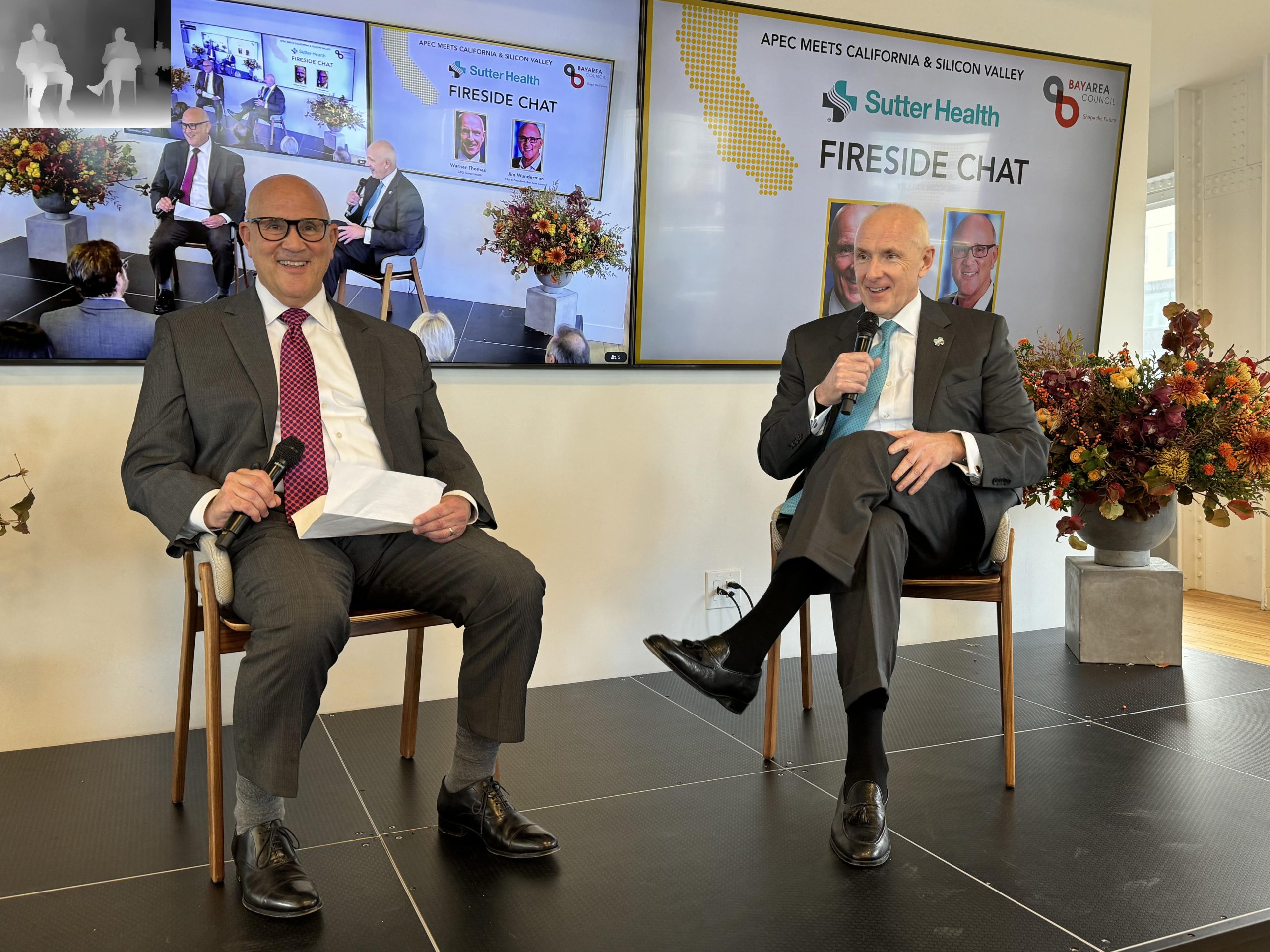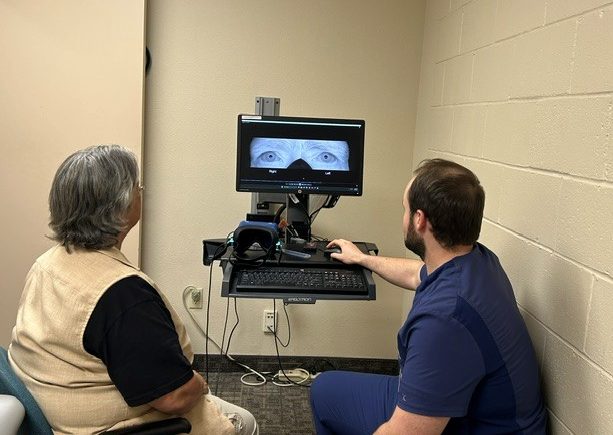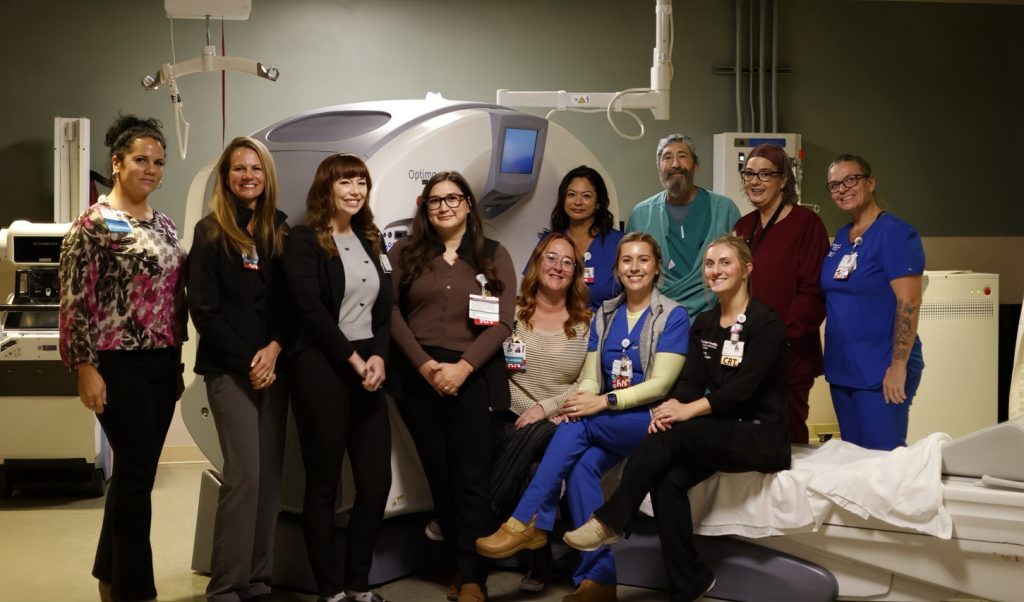Bay Area Council President and CEO Jim Wunderman (L) chats with Suter Health President & CEO Warner Thomas (R) during a fireside chat | November 14, 2023
The highly anticipated Asia-Pacific Economic Cooperation conference unfolded in San Francisco this week, bringing together leaders representing 21 member countries to delve into conversations about trade, economic growth and global initiatives. As a leader in healthcare and innovation and a major sponsor of APEC, Sutter Health leaders were invited to join discussions.
“It was an energizing week,” said Warner Thomas, president and CEO of Sutter Health. “Sutter has played a pivotal role in driving innovation, research, and progress in healthcare in the Bay Area and beyond, and APEC provides us a unique arena to share our insights and learn from a variety of leaders.”
During Thomas’ fireside chat with Bay Area Council president and CEO Jim Wunderman, the two tackled a range of topics including labor shortages and expanding access for patients in more convenient and equitable ways. Thomas provided many examples of how Sutter is stepping up to meet the health sector’s next critical moment.
Last summer, Sutter announced it will open more than two dozen ambulatory care sites in Northern California over the next four years, including a new surgery center in San Jose. Sutter also recently welcomed Sansum Clinic to its integrated network, providing enhanced access to high-quality care for communities along California’s Central Coast. Additionally, Sutter is growing its Graduate Medical Education-accredited programs. These programs, known as residency programs, are where medical school graduates undergo hands-on training in their chosen specialty.
Thomas noted that California loses far too many doctors due to the lack of available residency slots in the state, which are granted by Centers for Medicare & Medicaid Services. Reports say more than half of doctors choose to stay in the community where they trained. In response, Sutter is embarking on an ambitious plan to boost its residency program enrollment from 200 to more than 800 resident and fellow physicians annually by 2030. This strategic growth aligns with Sutter’s vision to lead and influence healthcare, not just in California but on a national scale.
According to Thomas, “We want the work done here to have a ripple effect, transforming the entire healthcare ecosystem by benefiting both clinicians and patients.” Sutter’s approach leans heavily on finding strategic solutions for addressing two of healthcare’s most complex access issues: doctor shortages and digital enabled health.
Technology and digitalization are a key component of how Sutter leaders are thinking about and planning for its future in an interconnected world, says Thomas. He underscored the role its newly announced Innovation Center in San Francisco will serve. “Our goal is to benefit patients in real-time and shape their healthcare experiences for the better. We know innovation is not just about technology; it’s about improving the lives of the people we serve.”
Sutter’s Innovation Center is set to launch in San Francisco in early 2024. It will cultivate partnerships, simulate and evaluate ideas in clinical settings and train clinicians to shape the future of healthcare. This dedicated space will incubate creative solutions for pressing healthcare issues, focusing on chronic disease treatment and preventative strategies across physical and mental health.
Sutter-Led APEC Healthcare Panel Emphasizes Access, Digital Innovation and Inclusion

Sutter Health Chief Clinical Innovation Officer Dr. Richard Milani speaks during a healthcare innovation panel at the Asia-Pacific Economic Cooperation (APEC).
Chris Waugh, Sutter’s chief design and innovation officer, and Dr. Richard Milani, Sutter’s chief clinical innovation officer, shared their thoughts on a Bay Area Council digital innovation and inclusion in healthcare panel. Waugh, as moderator, asked panelists, including representatives from Apple, Define Ventures and Filipino-based Ayala Healthcare, about everything from artificial intelligence to device wearables in the aging population. “We need to reengineer systems, so we’re not just focused on coming to the doctor’s office every time we need to do something,” said Dr. Milani.
Equity and inclusion also took center stage in the panel discussions, highlighting the importance of ensuring widespread access to healthcare tools and technology. Panelists recognized not everyone has access to the devices required for critical data collection. For instance, not every older adult has the means to afford an Apple watch, which can track their heart rate or help evaluate their risk of falling based on their gait. Waugh and Dr. Milani, along with the other panelists, encouraged leaders in the healthcare industry to continue to look at every decision, every piece of data with a diversity, equity and inclusion lens.
Sutter’s commitment to healthcare extends beyond California’s borders. By actively participating in APEC, a forum representing 40% of the global population and 50% of global trade, Sutter contributes to shaping international discussions on the digital economy and sustainable growth.
To learn more about how Sutter is embracing global health innovation through APEC and other events read this article by Warner Thomas.





